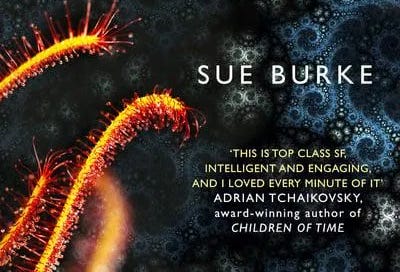Science Fiction: Semiosis
A discussion of culture and alien ecosystems and feminine character drama
Sue Burke’s Semiosis (2018) is a thought-provoking work of science fiction that explores interstellar colonization in a world with a billion-year evolutionary head start on Earth. The novel unfolds over multiple generations, following human settlers as they navigate life on an alien planet. While Burke’s extensive research and thoughtful portrayal of intergenerational conflict add depth to the story, the book leans heavily on a pacifist, humanist ideology that may not fully align with the harsher realities of survival.
Structurally, the novel is told through a series of vignettes, each focusing on key individuals from the first generation of settlers to the sixth. Early on, the colonists encounter an exceptionally intelligent life form that aids them in adapting to their new environment. The organism is not an animal in the traditional sense, which raises compelling questions about the distinctions between domesticated species, agricultural plants, and complex interspecies alliances. A sort of “whom is domesticating whom” question.
One of the book’s most intriguing themes is the nature of intelligence and the potential for sapient life beyond the animal kingdom. Semiosis suggests that given enough evolutionary time, plants—or other non-animal organisms—could develop sophisticated survival strategies, intelligence, and even the ability to communicate. This idea challenges our understanding of biology and pushes us to consider a world where every ecological interaction is a negotiation rather than a battle for dominance.
While the biological and philosophical aspects of the book are strong, its portrayal of human behavior is inaccurate and fanciful in many cases. The novel acknowledges that environmental pressures shape culture and behavior, yet the human society that emerges remains deeply committed to nonviolence in ways that seem unrealistic given their circumstances. Historically, small-tribe cultures tend to develop caution—if not outright distrust—toward outsiders, particularly in resource-scarce environments. Burke’s settlers seem to reject these tendencies despite facing significant threats. The result is a society that, while unique, sometimes stretches credibility.
The book approaches life from a decidedly feminine angle, with several fundamental assumptions about human societies that are entirely incorrect but assumptions easily made by a political feminist like Sue Burke. The work itself asks compelling questions about biology and interspecies communication but has a relatively poor take on human dynamics. Presuming artifacts of the 20th century to be universal: universal suffrage, female leadership, and other such nonsense.
The sequel to Semiosis, Interference, gives up on subtlety and delves straight into silly feminist archetypes and hand-maids-tail level fetishization: “the evil masculine society, men behaving like women, sufficient ‘understanding’ being enough to solve all problems and an ultimate desire for “daddy government” or the personification thereof to simply fix all the problems for you. The sequel is childish and reveals that for all her skill in botany and biology, Sue Burke absolutely cannot write a male perspective to save her life.
That said, Semiosis raises fascinating questions about communication, domestication, and symbiosis. Are humans and dogs truly symbiotic, or is their relationship more akin to domestication? How do species evolve to cooperate across generations? And if plants were to develop intelligence, how would they think, what would they value, and how would they perceive humanity?
Overall, Semiosis is a compelling read, particularly for those interested in ecological philosophy and the boundaries of intelligence. However, its exploration of human culture and survival instincts may feel oversimplified. For readers willing to embrace its speculative nature, the book offers an imaginative and deeply original perspective on life beyond Earth.





This is one of the few recent tradpub scifi books that I read and liked. That being said, I had to read it with one eye closed for the first couple of chapters, skimming over nonsense about exhausted resources and pacifism. But once we got past all those obligations, there was a good story about aligning the interests of very different parties. The relationship between the colonists and the plant was implausibly shiny and happy (it grows addictive fruits in order to enslave people!) but there were a few sharper moments. I remember the part where, in order to let the plant have a vote, the colonists redefined "citizen" as "anyone who can claim to be sentient." This of course means that 4-year-olds can vote, and their next president is a beloved kindergarten teacher.
Also, typo. Paragraphs 3 and 6 are duplicates.